Real Estate Software Development: Complete Guide for Property Businesses
September 05, 2024 • 367 Views • 33 min read
Tetiana Stoyko
CTO & Co-Founder
Real estate software development is among the most recent trends in the IT industry.
It is no secret that the real estate industry is highly competitive. This competition drives the integration and delivery of new, innovative customer services.
These services must be user-friendly and offer unique features to end users.
According to the latest reports, 45% of clients positively responded to technology integration in the property buying/selling process.
Combine it with the prevalence of various software solutions, mobile devices, and online platforms, and you will understand why real estate software development solutions are gaining popularity.
Access to a broader target audience and the ability to offer user-friendly software solutions are vital for competing in the market.
Still, they are not the only reasons to consider real estate software development.
Specialized software for the real estate industry becomes a must-have solution. Its market share is expected to reach 21,8 billion USD by 2030.
Apart from that, software-driven real estate shows better results in multiple fields, bringing a lot to the table.
Therefore, to dot the i’s and cross the t’s, we wrote this guide on real estate software development, where we will explain:
- What are the key benefits of software development for real estate
- What types of realty software development exist
- How the custom software development process looks
- How to choose a proper development company
- What are development best practices
- How to benefit the most from real estate software development solutions
Key Benefits of Real Estate Software Development
Let’s start with the basics.
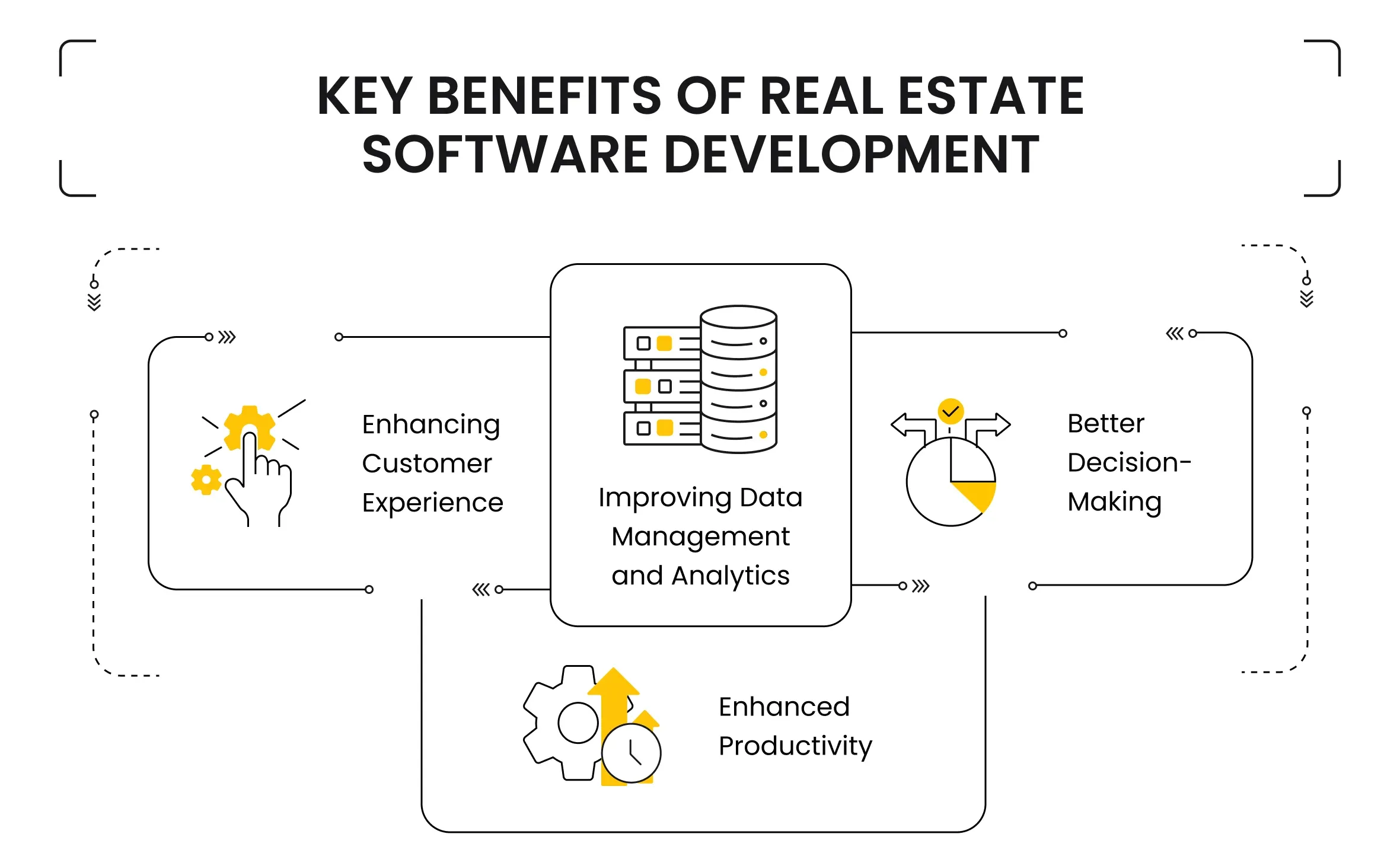
Like any other software solution, real estate software development offers a certain level of process automation, which can be implemented by a single dedicated software team.
This creates a more usable, friendly environment for business services and for monitoring and managing various business processes.
Enhancing Customer Experience
One of the most apparent benefits of realty software development is enhancing customer experience.
Having a working website or even a full-fledged mobile application makes it much easier and more convenient for customers to use the services of a real estate company.
Instead of talking on the phone or visiting an office, they can simply monitor a real estate marketplace online and choose the preferred options for further investigation.
Besides, it can continually be improved by integrating and implementing new UX/UI patterns, innovative solutions, and features.
Moreover, such integrations can be implemented by a single developer through team extension services.
Improving Data Management and Analytics
Real estate software development solutions are data-first. To rephrase it, real estate software development operates on data to fulfill tasks.
Data management practices are already included in any software solution. These practices are mainly limited to a basic level.
Even this basic data management can help handle and analyze data.
Moreover, real estate software development can include additional improvements and scaling of data management and analysis solutions to increase the efficiency of data-related processes.
You can also design and set up various data processing patterns, use specific methodologies, and implement tools for automated data analysis, migration, formatting, etc.
It can include dealing with customers' personal data or information about real estate assets, data mining, data-driven decision-making, and market trend identification.
Real estate software development and integration brings a prosperity of choices and solutions for deepening your business awareness.
Enhanced Productivity
Software development for real estate helps to improve business productivity and efficiency.
For example, it can include:
- real estate management software development,
- simplifying and improving management practices,
- offering advanced, software-driven methodologies and solutions.
Besides, there are countless software solutions for process automation.
So, your team can save time and effort by streamlining manual tasks and prioritizing the more complex or important ones.
Productivity and overall business performance are among the main benefits of software integrations.
Multiple solutions and systems are designed to upscale certain aspects of any business, regardless of its niche or industry.
They start with simple plugins and APIs that expand the range of offered services and end with complex applications such as CRMs, MLSs, and other management systems.
Better Decision-Making
Real estate software development services also provide businesses with practical decision-making solutions.
Even the most straightforward data management software can be easily upscaled for Big Data control and analysis.
It enables faster, more accurate predictions and valuable insights that can help make better choices in the results.
Custom real estate management software will bring tremendous value to businesses in this industry.
Such a solution will help define market trends and users’ expectations and demands, learn your target audience, and improve asset management and tracking.
Nevertheless, the software’s “helping hand” is defined by the realty software development project type, which shapes the set of features and services.
Types of Real Estate Software
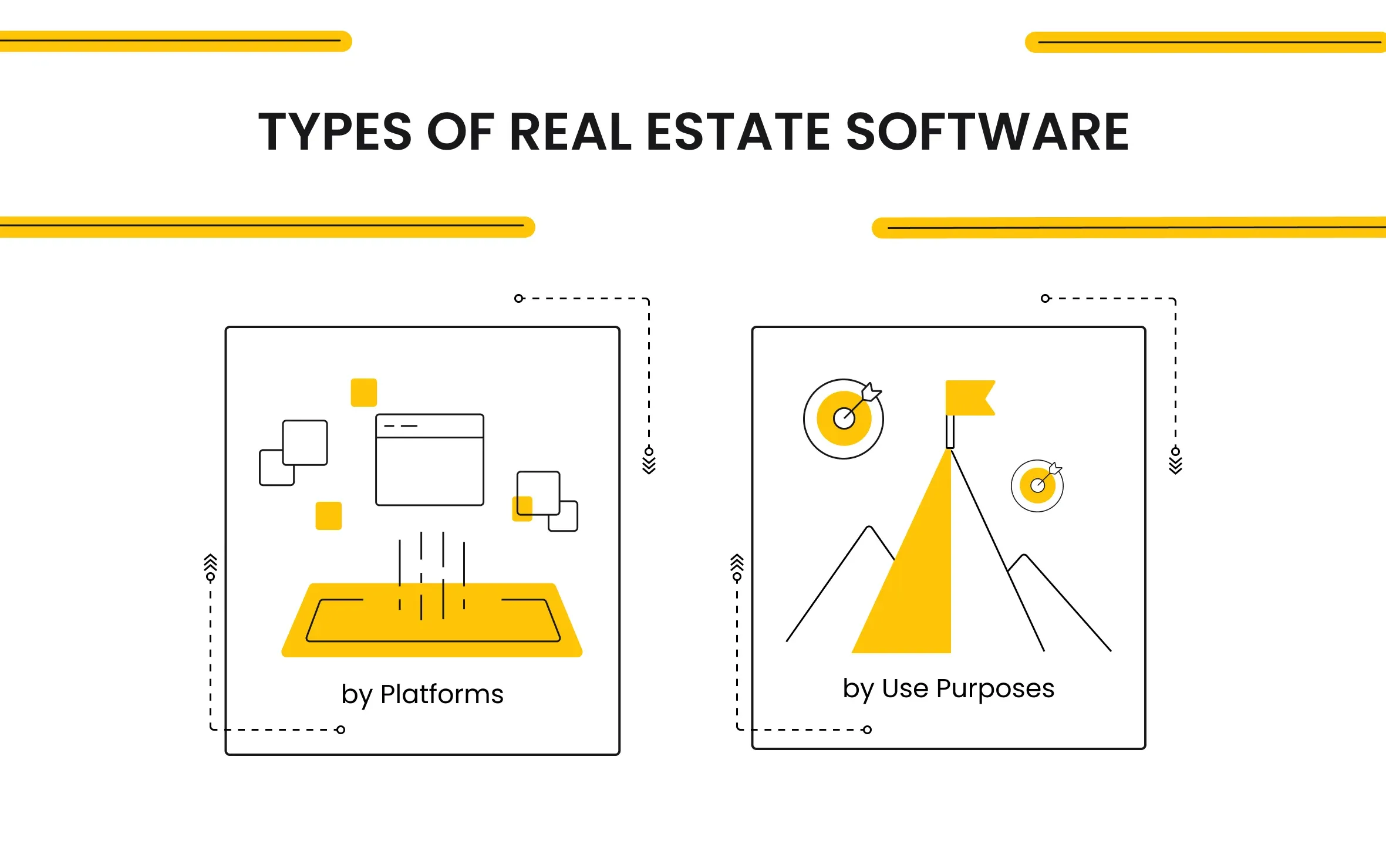
Real estate software development types vary by:
- Operational platforms it is based on
- Use purposes it is designed for
- Property types it is working with
By Platform
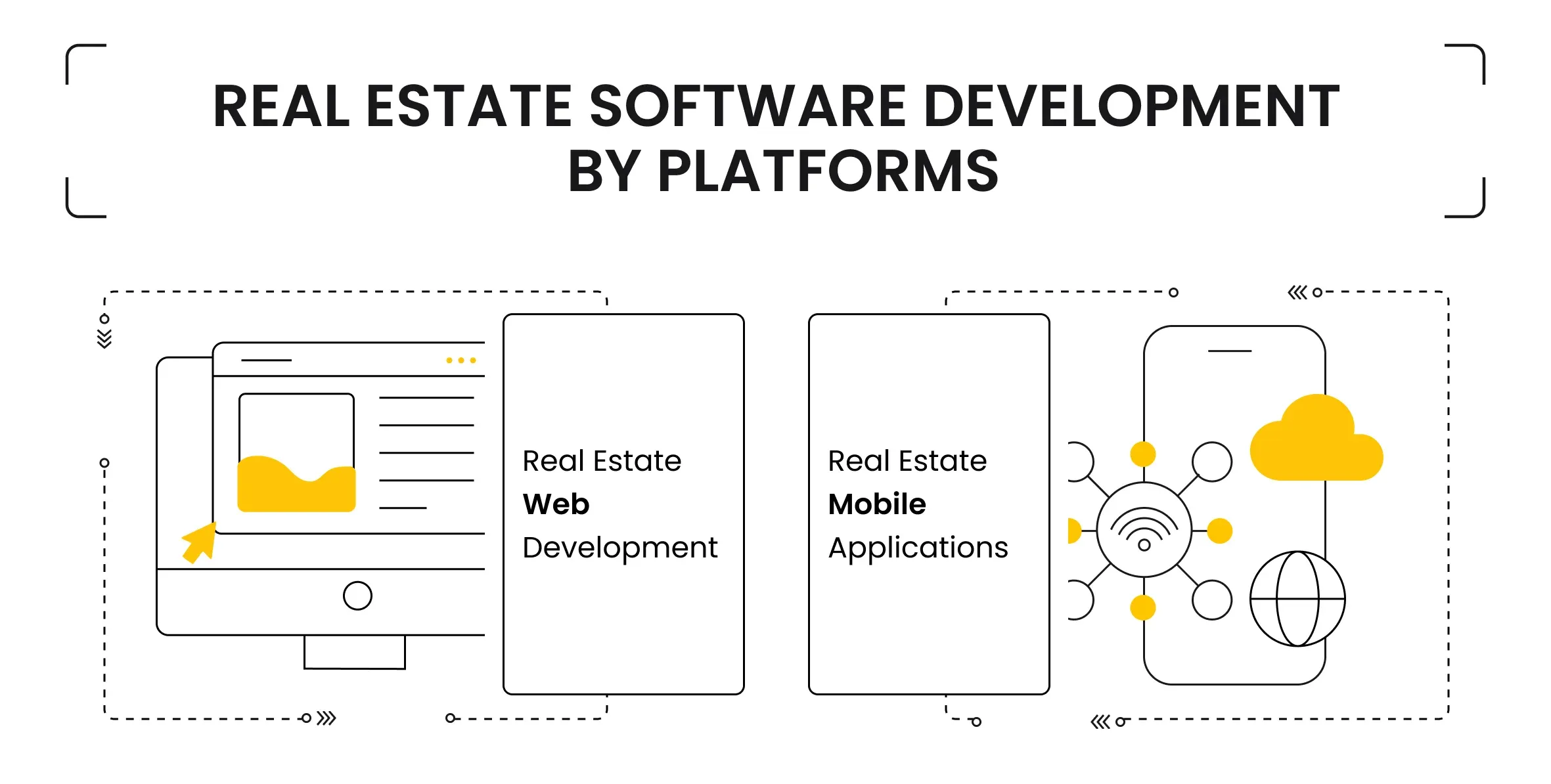
Web-Based Software
Real estate web development is a standard solution for creating property marketplaces and realty business websites.
Web app development services are the best approaches for such real estate business goals because:
- Web-based applications offer access to a great target audience because they can be reached from any device with Internet access.
- Such real estate software development services are much cheaper than full-fledged application development for desktops or mobile devices.
- Web-based real estate software development takes less time, reducing the development-to-deployment time.
- Websites and web applications have certain limitations in functionality. Still, they do not impact the must-have features for marketplaces or their performance.
Additionally, web platforms are a popular solution for real estate management software development.
Once again, developing a web-based platform for real estate management is much cheaper and faster, making it reachable from almost any device.
Combining web applications with cloud software development practices makes it:
- cheaper,
- safer,
- more efficient.
Finally, real estate web development is more flexible regarding data management, sharing, and processing, which are the most critical factors for productive management systems.
Mobile Applications
Real estate mobile app development is also known for creating marketplace platforms.
Still, this approach is more resource-intensive and demands more skills, time, and experience.
The reason for considering real estate mobile app development is the ability to integrate more advanced features that are not supported by web platforms.
It can be a virtual and augmented reality (VR/AR), offering users a virtual guide to the property.
Artificial intelligence (AI) is also widely integrated into such applications, creating a seamless user experience and enhancing other services.
Eventually, if you have enough resources to maintain a real estate mobile app development project, it is better to consider it seriously.
The final and most crucial benefit of platform-specific applications is their much greater scalability than web-based solutions.
To rephrase it, having a standalone application creates prosperity for further scaling and functional integration.
By Purpose
The intended uses of your future software also significantly impact the final product.
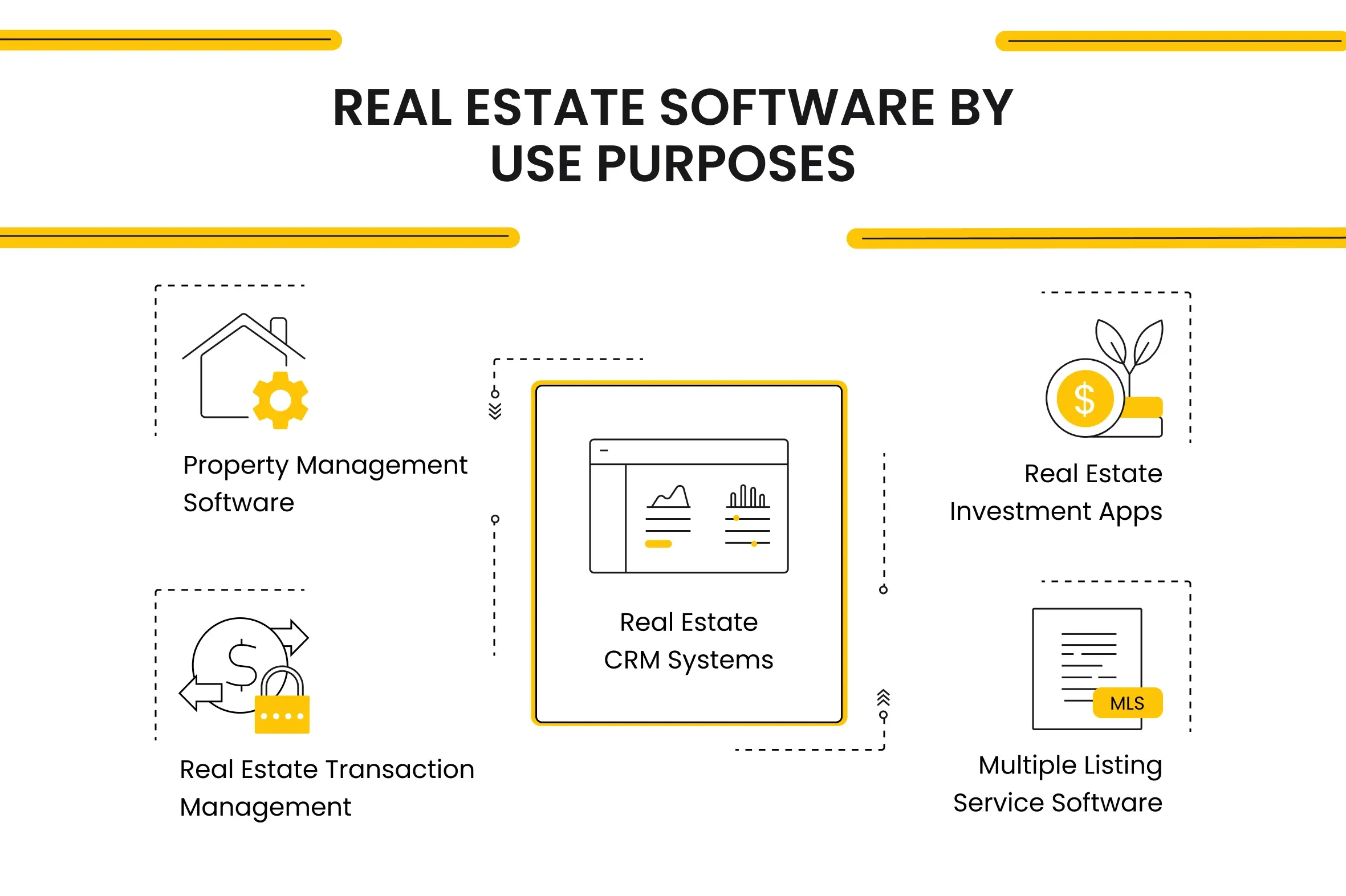
Clearly, if you are considering real estate CRM software development, it won’t offer the same features as a web-based marketplace, and vice versa.
Property Management Software
Property management software development is one of this industry's most flexible and least demanding projects.
The reason for this is simple: multiple solutions, some of which do not require software development, are possible to meet the business needs and expectations.
Such platforms can be used for numerous cases, such as:
- HOA (Homeowners Association) management software
- Tenant screening and rent administration
- Realty assets tracking and maintenance, etc.
This software has much in common with other management software solutions.
So, there are many ways and off-the-shelf solutions that can be used instead of maintaining a full-cycle software development project from scratch.
For instance, many ready-made management systems are distributed as Software-as-a-service solutions.
So, instead of wasting time and resources, businesses can find the most suitable SaaS and integrate it into their business.
However, saving development time and resources comes at a price.
When choosing off-the-shelf management software, a business has to understand that it has no control over or impact on the software.
When the company scales or needs new features and solutions, there are two ways to meet new demands:
- Find a new off-the-shelf solution that satisfies your needs.
- Maintain its property management software development project.
Besides, custom real estate software development might seem less beneficial initially.
It will pay off in the long term, as it is cheaper and more flexible for a fast-growing real estate business.
Real Estate CRM Software
Real estate CRM software development is essential for any business that aims to succeed.
Customer Relationship Management (CRM) software helps to track, analyze, and improve interactions with clients, ensuring the success of your communication with potential clients.
CRM systems primarily share the same features, regardless of industry or niche specifics.
Nevertheless, most of these standard features are essential tools for client relationship management.
So, if you want more flexibility and control over client-oriented communication, or to personalize services and the user experience, you need custom CRM software development.
Custom CRM systems offer a more flexible structure, support for additional software integrations, and other valuable benefits that many ready-made systems can't match.
Real Estate Investment Software
Unlike the rest of the software systems for the real estate industry, software for real estate investment has unique requirements and demands.
First, real estate investment software must visualize and provide users with convenient interfaces.
Real estate investment apps must provide a user-friendly experience and infographics to make investment returns easier to understand.
Such applications mainly aim to gather, analyze, and visualize the income from each asset.
Integrating best data management practices can also be beneficial, supporting data analysis and informing market predictions.
However, significant landlords are not the only users interested in such software.
For instance, it can be used by households, hotels, or other companies that maintain large properties.
Building companies can also significantly benefit from having such solutions at hand.
Real Estate Transaction Management Software
To cut a long story short, real estate transaction management software offers solutions for managing and tracking various transaction processes and documentation.
It is a centralized platform that stores all documents and transaction data. Besides, it can offer various supplemental tools, such as calendars, reminders, pop-up notifications, and other small features.
Having such software under the hood simplifies tracking transactions, staying aware of recent events and agreements, etc.
A significant advantage of such software is that it can be integrated as a set of features into existing management systems rather than developed as a standalone application.
Multiple Listing Service (MLS) Software
MLS is a platform for cooperation and collaboration among property brokers.
It helps share information about recent assets for sale or rent and encourages other market actors to help distribute them.
This powerful tool allows even the smallest brokers to compete with industry giants.
Such software development is relatively simple to embody.
Yet, choosing ready-made solutions over custom development might be more beneficial: such systems are built on collaboration and active user communities.
When you create a new MLS system, you will also have to find ways to motivate other actors to join your shared base.
Unless you already cooperate with a few real estate companies, you might consider developing a personal semi-private cooperation platform for you and your partners.
Then, such custom real estate software development projects won’t be a challenge.
By Property Type
Real estate software development might vary depending on the property type.
One of the most important factors to include in your real estate software is the option to choose between commercial and residential real estate.
The main difference between commercial and residential real estate software is the data needed to show and operate.
Commercial Real Estate Software
It is better to include additional aspects such as location ratings, local taxes, and the rental or purchase price.
In conclusion, when developing commercial real estate software, it is better to provide potential tenants/buyers with all the information they need to benefit their businesses and succeed.
Clearly, businesses have much more data requirements than regular house buyers:
The more data a company has, the more accurate its estimations can be.
Residential Real Estate
Residential real estate software demands are totally different.
Potential residential property buyers are not interested in client reach or other valuable business information.
Instead, you should prioritize valuable household information, such as the condition of the infrastructure, the nearest stores and schools, etc.
How AI is Transforming Real Estate Software Solutions?
Before discussing the stages of real estate software development, let’s have a quick word about artificial intelligence and its role.
AI solutions have switched from a fancy feature to a must-have feature in just a few years.
Such software drastically changes tech-related industries and solutions in a matter of days.
We are talking not only about the impact of this feature on the software development process, but also about its use cases for business automation.
According to Coherent Market Insights, leading real estate market players are actively investing in AI and blockchain integrations.
Such a focus on innovative technologies is easy to explain.
For instance, AI solutions can help your real estate agents save up to 40 hours/week, streamlining multiple routine tasks.
These tools are highly flexible and can be used for countless use cases across industries and tasks.
The only core challenges of integrating such software are:
- Finding a reliable tech vendor to complete AI implementation
- Choosing the most suitable artificial intelligence model
If you succeed with the above tasks, your real estate business can grow exponentially.
Modern AI-driven solutions are already automating whole business cycles and operations, such as customer support and data analysis.
Yet, you can benefit from artificial intelligence in other fields as well. For instance, it can significantly speed up the realty software development process.
The Development Process for Real Estate Software
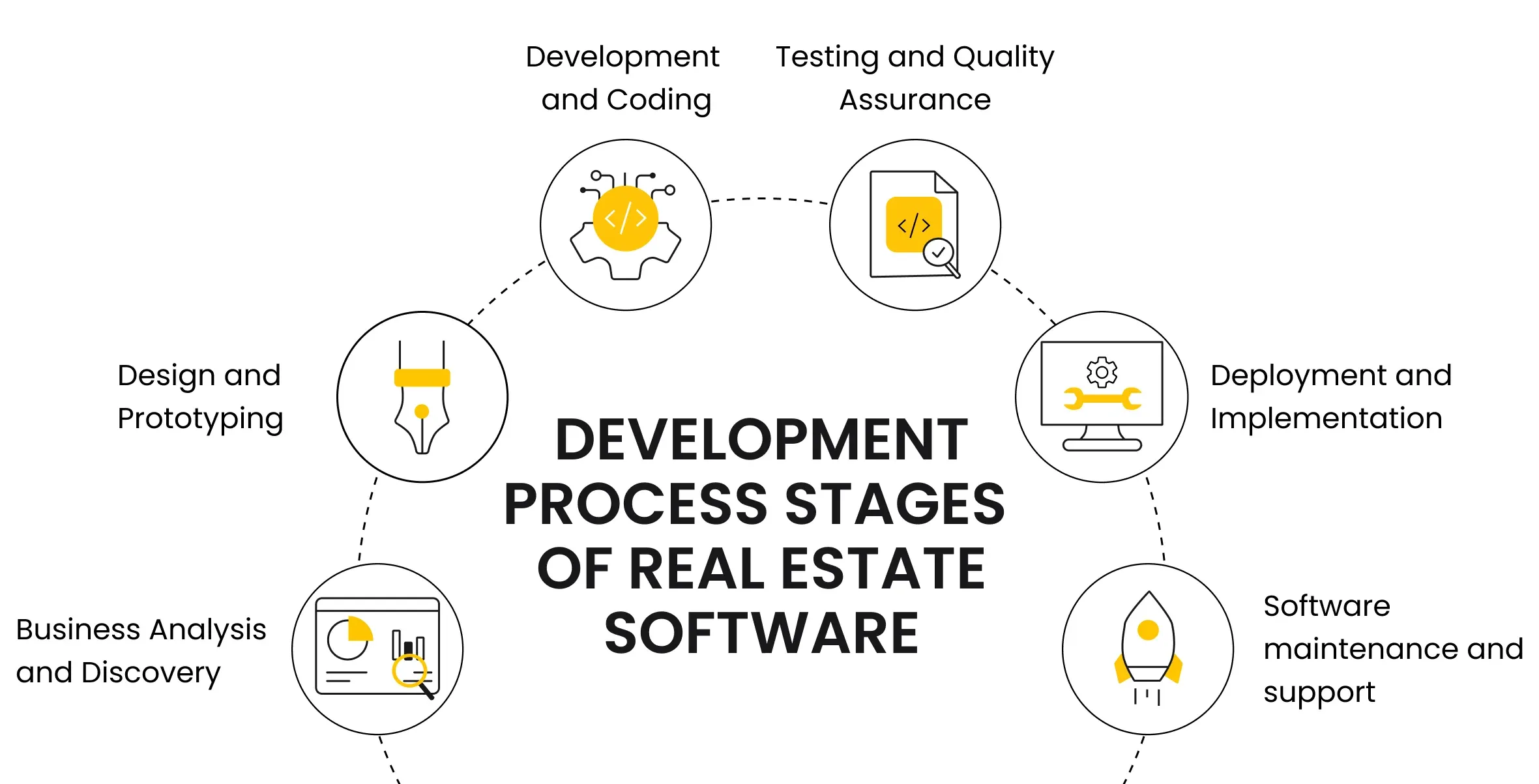
Frankly, software development for real estate has no significant differences from other software projects.
Each software development process requires the same six must-have phases:
- Business analysis
- Software design and prototyping
- Developing and coding stage
- Testing and QA process
- Product deployment and implementation
- Post-launch support and maintenance
The difference between custom real estate software development and other IT projects lies in the details:
Chosen tech stack, features to build, suitable software solutions to choose from, etc.
Business Analysis
Any real estate software development company will start by analyzing your business.
This allows your contractors to learn the main issues and demands.
It is almost impossible to create a successful software product without knowing the overall business context.
Business analysis is a key step in finding the most effective way to deliver the software products demanded.
Design and Prototyping
After understanding the business needs and expectations, your dedicated team will create prototypes of future software products.
Thus, you will see the final result, how it will look, what services and features it will provide, etc.
At this phase, business owners should examine the prototype, discuss it, and suggest implementation changes.
Thanks to prototyping and discussion, both parties can stay on the same page and understand the tasks clearly.
Development and Coding
The name of this stage speaks for itself.
At this moment, software development teams are building an app by coding.
Long story short, during this phase, developers implement features, build IT infrastructure, and inform business owners about recent progress and challenges.
At this stage, a business's responsibilities are narrowed down to keeping in touch with developers, discussing progress, and managing them by prioritizing tasks.
It is essential not to interfere in development by micromanaging every process.
Trust your software engineers; they are most certainly aware of what they are doing and how to do their work right.
Testing and Quality Assurance
After coding an app, your team should also perform testing and quality assurance to find and fix bugs or other issues.
Still, it doesn’t mean that the QA team is engaged only after the development stage.
In most cases, quality assurance specialists are already involved in the development stage, following the new code units and testing them for bugs.
However, most bugs and code errors are fixed after the development phase, making it easier to avoid unwanted impacts on the rest of the code and to prevent developers from being distracted from their primary task.
Deployment and Implementation
Once the most crucial issues are resolved and quality assurance is successful, developers can deploy the code and push an app to live.
Post-Launch Support and Maintenance
Finally, after the application is live, it doesn’t mean your technological partner’s responsibilities are over.
After the successful launch, it is essential to support and maintain the app for some time. This helps look for bugs again and ensure that everything works as intended.
During this phase, developers commonly work on improving software performance, polishing the product, fixing minor bugs, etc.
Choosing the Right Development Partner
The success of software development highly depends on the reliability of the development partner.
To help you find a real estate software development company capable of delivering the desired product, we suggest you follow the short checklist.
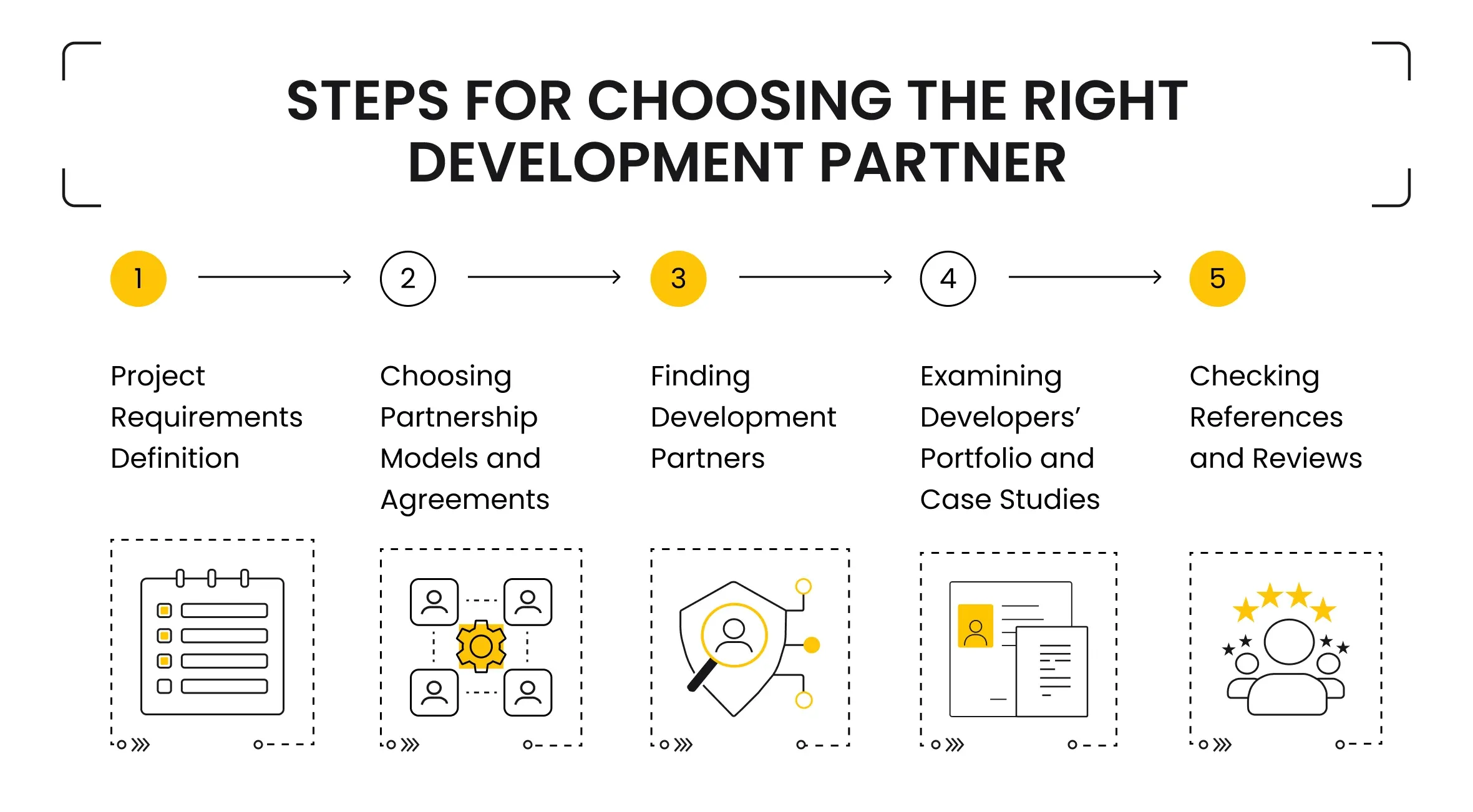
Clearly Define Your Project
First of all, you should clarify your project and demands.
To simplify, you should have a clear understanding of your idea before contacting the software development team.
Still, having a clear understanding is not enough.
Most likely, before starting real estate software development, your contractors will ask many development-related questions.
You will also need to clarify everything in detail to estimate the scale of the work better and fully understand the most suitable solutions.
For example, “I want an app with high performance” is insufficient. Instead, try applying metrics and more specifics:
“We need a web application that will show more than 90% performance results in certain testing tools”.
Consider Partnership Models
After discussing your project ideas, you should also choose a partnership model.
- How will you collaborate with the development team?
- Whether it is an in-house or outsourced team?
- Offshore or nearshore?
- Will it be agile or plan-driven development?
- Fixed price or time-and-materials?
Frankly, countless questions await answers.
Evaluate Development Companies
Once you have defined the basic requirements for the development team, you can begin looking for a real estate software development company.
The easiest way is to monitor B2B platforms like Clutch and GoodFirms, or similar alternatives.
Such services gather all vital information about software development companies and display it in a user-friendly way.
There, you can find almost everything you need to choose potential software partners:
- Feedback and reviews from previous clients
- Recent case studies
- Technologies and industries developers are familiar with
- Links to other platforms and website
- Average development costs
Still, these B2B platforms do not display all the information, so it is better to list possible development companies for further investigation.
The company’s website usually suggests more data on its experience and expertise.
Review Portfolio and Case Studies
So, after you have a list of companies you are interested in, you can visit their websites to learn more about them and narrow down the list.
Case studies are probably the most valuable page on the website.
There, you can find not only recent projects but also an overview of the overall portfolio.
Additionally, companies commonly divide cases by industry or tech stack, making it even easier to find the most experienced team that meets your requirements.
Check References and Reviews
Finally, don’t underestimate client references and reviews. Both can be found in case studies and on B2B platforms.
Apart from reading text reviews, you can also contact these companies for more detailed reports, primarily if these companies work in the same industry or offer similar services.
As a result, you can get an even more profound analysis of the company’s suitability for future tasks.
Best Practices for Real Estate Software Development
Finally, we can also recommend some best practices for benefiting the most from real estate software development services.
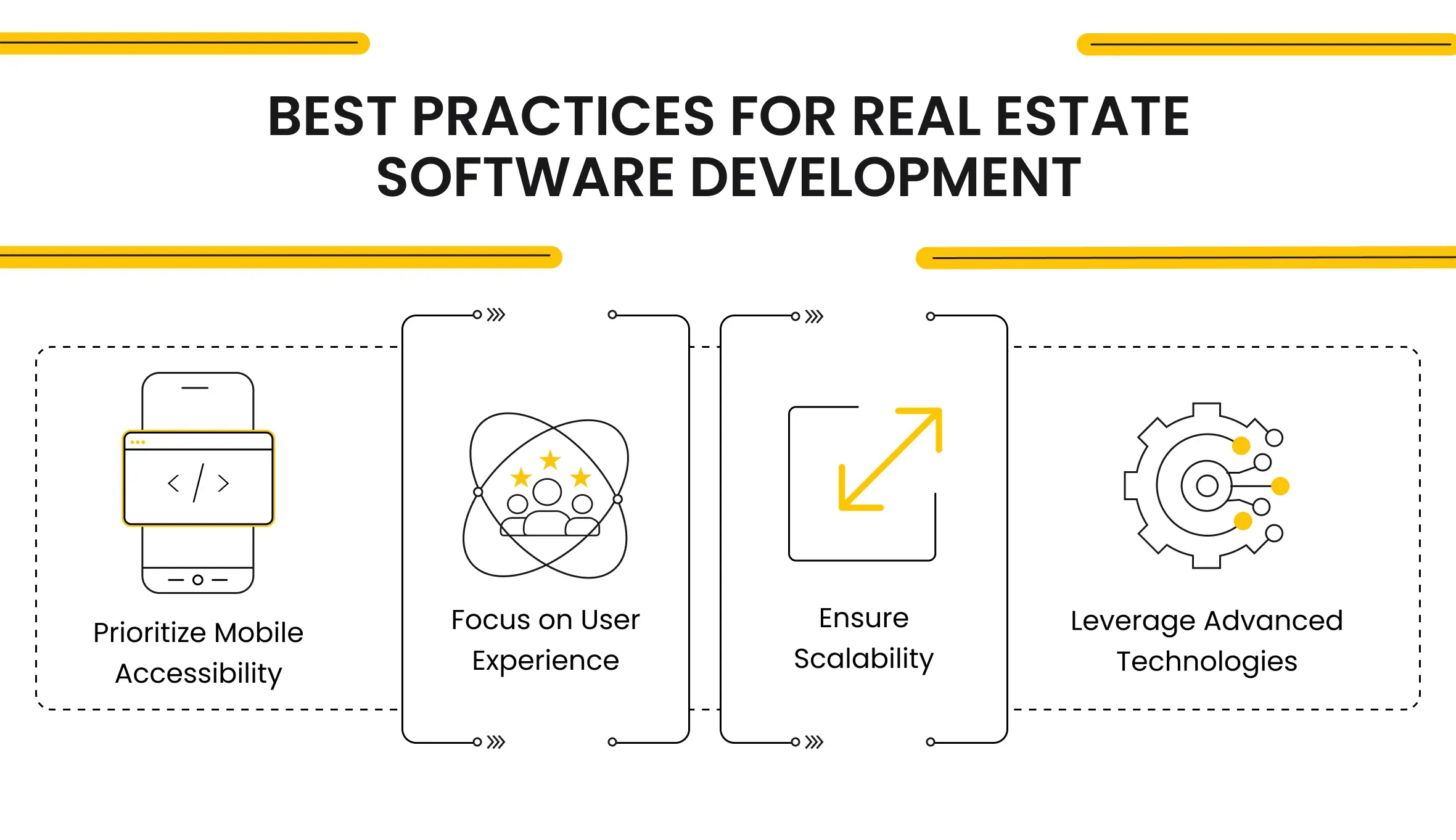
Prioritize Mobile Accessibility
Don’t underestimate the importance of mobile devices. According to Statista, 96.3% of users use various mobile devices to access the Internet.
Mobile phones have already become an everyday tool for a wide range of tasks.
So, ensuring mobile accessibility for your future real estate application is a must-have.
Besides, it is not limited to mobile app development. In fact, even real estate web development includes adjustments and mobile suitability.
There are multiple practices and options to ensure high efficiency for web apps on mobile and other devices, so use them.
Focus on User Experience
User experience is also a must-have option.
The various UX/UI designs and methodologies for improving these metrics suggest countless ways to ensure a seamless user experience.
Still, one of the best tactics for creating the best user experience in a real estate software development project is to gather and analyze user feedback.
You will learn about potential bugs, issues, and user needs.
Moreover, you can understand your target audience's demands and expectations and plan future project scaling based on these requirements.
Ensure Scalability
One of the most significant advantages of custom real estate software development is complete control over the software application.
It is preferred to discuss the potential scalability of the software in the future.
Therefore, software engineers will design the development process to ensure future scalability and avoid potential code conflicts or other issues.
Leverage Advanced Technologies
Finally, it is preferred to integrate advanced, innovative technologies into your real estate software development project.
Don’t rush your decisions. Take your time and discuss such ideas with developers.
They can suggest the best and most beneficial solutions, which they are familiar with and know how to handle.
Innovations increase your competitiveness by supplying users with unique solutions.
Yet, it can also bring significant value to the business, offering process automation, enhancing data management and analysis, etc.
Still, to benefit most from these innovations, you should ensure that your real estate software development services provider can develop and integrate them and that your audience expects or will use them regularly.
What’s your impression after reading this?
Love it!
1
Valuable
1
Exciting
1
Unsatisfied
1
FAQ
Let us address your doubts and clarify key points from the article for better understanding.
What technology stack is commonly used for real estate software development?
A common technology stack for real estate software development includes:
- Frontend: React.js, Angular, or Vue.js for building responsive user interfaces.
- Backend: Node.js, Ruby on Rails, or Django for handling server-side logic and APIs.
- Database: MySQL, PostgreSQL, or MongoDB for data storage.
- Cloud Services: AWS, Google Cloud, or Azure for scalable infrastructure and hosting.
- APIs: Integrations with MLS (Multiple Listing Service) and payment gateways.
- Mobile: React Native or Flutter for mobile app development.
- Mapping: Google Maps API for property location visualization.
This stack provides scalability, security, and flexibility needed for real estate platforms.
What are the main challenges in real estate software development?
The main challenges in real estate software development include:
- Integration with Multiple Listing Services (MLS) and third-party APIs.
- Data security and compliance with regulations like GDPR.
- Scalability to handle large volumes of data and users.
- Accurate property data management, including location and pricing.
- User experience (UX) for diverse user types (agents, buyers, sellers).
- Customizability to meet varying client needs in different markets.
How can real estate software improve my business operations?
Real estate software can improve business operations by automating tasks like property management, lead tracking, and client communication. It provides real-time access to data, enhances decision-making, streamlines workflow, and improves customer experience with tools like virtual tours and online document management. Additionally, it can integrate marketing tools and analytics to boost sales and efficiency.
How can real estate software improve customer experience?
Real estate software improves customer experience by offering features like virtual property tours, real-time property listings, and easy communication with agents. It provides personalized recommendations, online document signing, and instant access to market data, making the buying, selling, or renting process more convenient and efficient.
How long does it take to develop real estate software?
Developing real estate software typically takes 4 to 12 months, depending on the complexity, features, and integrations required. Basic solutions may take a few months, while more advanced platforms with custom features and third-party integrations can take longer.
YOU MAY ALSO LIKE
Must-Have Features for Successful Real Estate Mobile App Development in 2024
Let’s talk!
This site uses cookies to improve your user experience. Read our Privacy Policy
Accept
Share this article